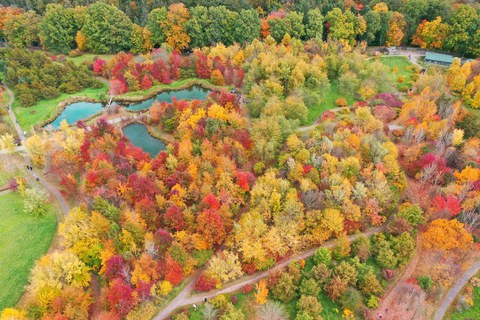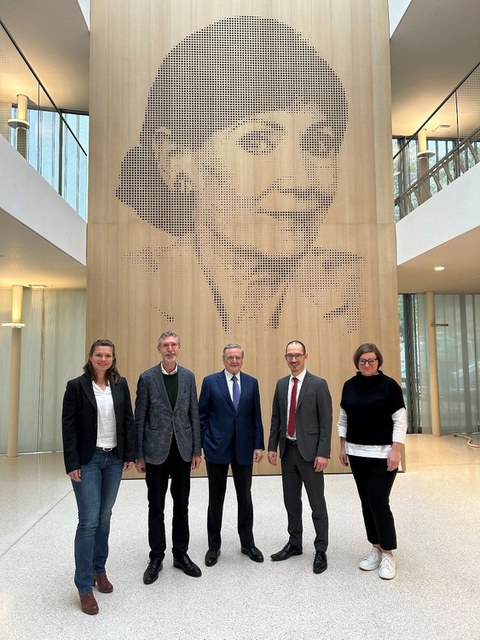Jan 31, 2025
Eva Mayr-Stihl Foundation provides EUR 1 million to promote forest-related environmental communication at TU Dresden

The Forest Botanical Garden of the TU Dresden in Tharandt.
Anyone studying forestry these days knows that foresters not just take care of trees and maintain the forest. Their tasks moreover also include advising forest owners, conducting educational events in the forest and answering questions from visitors and those interested in the forest. Therefore, knowledge and skills in “forest-related environmental communication” are in high demand. Today, TU Dresden offers relevant courses in the Bachelor's and Master's degree programs in forestry. Nevertheless, a recent Germany-wide survey revealed that many forestry students would like to see more courses in this area and, above all, more opportunities to put their communication skills into practice.
In addition to teaching, more research on forest communication is needed. In recent years, the Department of Forest Sciences at TU Dresden has already implemented a number of high-profile research projects on this topic. From mid-2025, the Eva Mayr-Stihl Foundation will fund a junior research group on “Forest-related environmental communication” at the Department of Forest Sciences in Tharandt (Chair of Forest Policy and Forest Resource Economics) with a total funding volume of just over EUR 1 million. Robert Mayr, founder and chairman of the Eva Mayr-Stihl Foundation, explains the funding: “We have been supporting the Department of Forest Sciences in Tharandt for 30 years now, initially with smaller grants and later also for larger projects. We are now supporting the junior research group so that it can boost the advancement of the Department.”
Forestry as a link between trees and people
Humans have always tried to observe and understand the environment. But most of what we know about our environment and the forest is not something we have observed ourselves. Rather, we have learned about it at school or from the media. Prof. Norbert Weber, Chair of Forest Policy and Forest Resource Economics, comments: “The way in which information about the forest is communicated largely determines what we think about the forest and its foresters, and how we behave in the forest.” While we communicate – whether it's in the forest, on social media, in companies or at the kitchen table at home – we exchange ideas about how the forest should be treated both now and in the future. Foresters are therefore very much interested in engaging in dialog with the various interest groups of the forest.”
This requires a high level of communication skills from forestry stakeholders and underlines the need for a sound education in the field of environmental communication. This training should cover all essential components: science communication, internal and external corporate communication, public relations, educational approaches such as outdoor education and education for sustainable development, as well as the necessary fundamental from communication, media and social sciences (e.g. human-forest relationships, target group segmentation, media-adequate communication, media effects). Appeals for these topics to be given greater consideration in forestry teaching and research have been repeatedly voiced from various sides. The funding provided by the Eva Mayr-Stihl Foundation allows for the establishment of a new junior research group called “Forest-related Environmental Communication” at TU Dresden's Department of Forest Sciences in Tharandt from mid-2025 to meet the ever-increasing demand.
Forest-related environmental communication in teaching and research
One of the new junior research group's core tasks will be to ensure that courses in forest-related environmental communication are offered, expanded and optimized. The main goal is to increasingly plan, organize and implement teaching and learning methods that are geared even more towards practical application, such as forest education events, forest tours, tree planting campaigns, social media campaigns, news blogs, discussion forums, and forestry advice. In addition to teaching, the junior research group “Forest-related Environmental Communication” will also focus on research in this field and promote networking with internal and external TUD partners. One of the special features of research in Tharandt is the balanced consideration of both the protection and the use of forests, while the latter aspect is increasingly losing significance at other universities. It is therefore essential to explore how people's perceptions, attitudes and behavior towards forests are changing. Moreover, the new junior research group will investigate how citizens can participate in future forest development, how cooperation with and between different forest owners can be made more efficient, and how to better raise awareness of the risks and consequences of climate change for our forests and us as humans.
The Eva Mayr-Stihl Foundation as a key partner

Group photo* on the occasion of the presentation of the “Junior Research Group Forest-related Environmental Communication” project at the Eva Mayr-Stihl Foundation in front of the portrait of the founder Eva Mayr-Stihl.
TU Dresden's Department of Forest Sciences is currently seeking to strengthen its program in the field of social sciences. Thanks to the support of the Eva Mayr-Stihl Foundation, the field of environmental communication on forestry issues can now be significantly expanded, which also yields synergies with other TU Dresden institutions. The foundation is one of the largest charitable foundations in Germany and, in addition to medicine, art and culture, primarily promotes forestry. The foundation finances several Endowed Chairs, supports the Forest Park Tharandt, and honors outstanding research by early-career scientists with the German Forest Science Prize.
* From left to right: Sandra Liebal (Team member of the Chair of Forest Policy and Forest Resource Economics) – Prof. Norbert Weber (Chair of Forest Policy and Forest Resource Economics) – Robert Mayr (Board of the Eva Mayr-Stihl Foundation) – Michael von Winning (Board of the Eva Mayr-Stihl Foundation) – Susann Pfeiffer (Manager of the funding priority Science & Research of the Eva Mayr-Stihl Foundation)
Contact:
Prof. Norbert Weber
Chair of Forest Policy and Forest Resource Economics
Email:
Tel.: +49 351 463-31828
